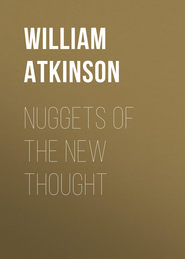По всем вопросам обращайтесь на: info@litportal.ru
(©) 2003-2024.
✖
Dynamic Thought; Or, The Law of Vibrant Energy
Настройки чтения
Размер шрифта
Высота строк
Поля
But, we are speaking of the new school of advanced Material Science now – not of the old conservative "All is Matter" people, who have been left behind. The new school speaks of Substance now, instead of Matter, and ascribes to "Substance" the properties of Matter, Energy, and something that they call Sensation, by which they mean Mind in a crude form, and from which they say Mind and "Soul" evolved.
This new school of Scientists are very different from their predecessors – they are less "hide-bound," and far from being so "cock-sure." They are seeing Matter melting into Energy, and giving signs of Sensation, and they are beginning to feel that, after all, there must be a Thing-in-Itself, that is the real basis of, or "real thing" in Substance. There is heard very little among them about "dead matter"; "blind force"; or of the "mechanical theory" of Life and the Universe. Instead of it being a big machine, operated under mechanical laws, with Life as the steam, the Universe is beginning to be regarded as somehow filled with Life, and Science is finding new examples of Life in unexpected quarters, and the "dead matter" area is being narrowed.
Men who have followed the advances made by recent Science are holding their breaths in awe and earnest expectation – and those who are pushing the inquiries and investigations to the furthest extent are showing by their eager faces and trembling hands that they feel that they are very close to the border line separating the old Materialism from a New Science that will give Thought and Philosophy a new impetus and a new platform. Such men are feeling that they are seeing the old Matter melting away into something else – the old theories are falling apart under the light of new discoveries – and these men feel that they are penetrating a new and hitherto unexplored region of the Unknown. May success be theirs, for they are now on the right road to Truth.
In the following chapters we shall see frequent references to "Science" – and when we use the word we shall know it means this new school of Scientists, rather than the older school that is now being superceded. There is no conflict between True Occultism and True Science, notwithstanding their directly opposite theories and ideals – they are merely looking at the Truth from different viewpoints – at different sides of the same shield. A better day is coming, when they shall work together, instead of in opposition. There should be no partisanship in the search for Truth.
Things have worked this way: Occultism would enunciate a theory or principle – but would not attempt to prove it by material facts, for it had not gathered the facts, having found the principle within the mind, rather than without. Then, after laughing at the occult theory or principle, Science would search diligently for material facts to prove an opposite theory, and in so doing would unearth new facts that would support the Occultists contention. Then Science would discard its old theory (that is, the younger men would – the old ones, never) and proceed to proclaim a new theory or principle, under a new name, and backed up with a mass of facts and experiments that would create a new school with many enthusiastic followers. The old claim of the Occultists would then be forgotten or else go unrecognized under its old name; or disguised by the fantastic and bizarre coverings which some so-called Occultists had draped around the original Truth.
But, so long as Truth is being uncovered, what matters it who does the work, or by what name he calls his school. The movement is ever forward, and upward – what matter the banner under which the armies move?
In this book the writer will advance a very different theory of the Universe of All-Things from that of Modern Science, although he feels that his theory may easily be reconciled with the most advanced views of that school.
In the first place, as he has stated in the first chapter, he does not hold that the Universe, as we know it, is self-sufficient, but he recognizes a Something back of all phenomena and appearances, which Something he calls "The Infinite."
And he differs very materially from the views of those who claim that Mind is but a property, or quality, or something proceeding from Matter or Force, or Matter-Force, or Force-Matter – according to the views of the respective schools. He takes an entirely different and opposite position.
He holds that all that we call Matter (or Substance) and Mind (as we know it) are but aspects of something infinitely higher, and which may be called the "Cosmic Mind." He holds that what we call "Mind" is but a partial manifestation of the Cosmic Mind. And that Substance or Matter is but a cruder or grosser form of that which we call Mind, and which has been manifested in order to give Mind a Body through which to operate. But this view he merely states in passing, for he makes no attempt to demonstrate or prove the same, his idea being that it forms a different part of the general subject than the phase of "Dynamic Thought," to the consideration of which this book is devoted.
He also differs very materially from the Materialistic school in his conception of Force or Energy. Instead of regarding Force as a distinct principle, and as something of which Mind is but a form, he walks boldly out into the arena of Scientific Thought, and throwing down his gauntlet, proclaims his theory that "There is no such thing as Force apart from Life and Mind" – "All Force and Energy is the product of Life and Mind – all Force, Energy and Motion result from Vital-Mental Action – all Force, Energy and Motion is Vital-Mental Force, Energy and Motion." – "The Mind abiding in and permeating all Substance, not only has the power to Think, but also the power to Act, and to manifest Force and Energy, which are its inherent and essential properties."
He also takes the position that Mind is in and about and around Everything. And that "Everything is Alive and Thinking." And that there is no such things as "Dead-Matter," or "Blind-Force," but that all Substance, even to the tiniest Particle, is permeated with Life and Mind, and that all Force and Motion is caused and manifested by Mind.
He holds that all forms of Force, Energy and Motion, from the Attraction of the Particles of Matter, and their movements in response thereto, up to the Attraction of Gravitation, and the response of the Worlds, and Suns, and Stars, and Planets, thereto – are forms of Mental Energy and Force, and Action. And that from the tiniest atom, or particle, to the greatest Sun – all obey this Great Action of Mind – this Great Force of Mind – this Great Energy of Mind – this Great Power of Mind.
And upon this rock – this rock of Truth, he believes it to be – he takes his stand, and announces his belief, and bids all-comers take notice of what he believes to be a germ-thought that will grow, develop, and increase so that it will eventually permeate all Scientific Thought as the years roll along. He calls this theory "The Theory of Dynamic Thought."
CHAPTER III
THE UNIVERSALITY OF LIFE AND MIND
THE writer has deemed it advisable to preface his consideration of "Mind" in itself, as well as of Substance and Motion, with two chapters, the purpose of which will be to demonstrate that Mind, in some form or degree, is to be found in connection with all Things – and that Everything has Life – and that Mind is an accompaniment of all Life. To many the term "Mind" means only the "thinking quality" of man, or perhaps of the lower animals; and "Life" the property only of such organic creatures. For that reason it has been deemed advisable to point out that Life and Mind are found even in the lowest forms of substance – even in the inorganic world.
In this chapter and from now on, the writer shall use the term "the Mind," etc., to indicate the particular mental principle of the creature or thing – the bit of Mind that is segregated from the rest, and which each person thinks of as "mine," just as he thinks of "my" body, as distinguished from the universal supply of Substance. The term "Mind" will be used in its Universal sense.
And, the writer intends to use Elmer Gates' term, "Mentation," in the sense of "effort; action; or effect; in or of, the Mind" – in short, "mental process." The word is useful and when one has learned to use it, he will prefer it to the more complicated terms. Remember, then, please – "Mentation" means "Mental Process." Mentation includes that which we call "Thought," as well as some more elementary forms of mental process that we are not in the habit of dignifying by the term, Thought, which latter we usually reserve for mental process of a higher order.
So, then, "Mind" is the something of which one's particular Mind is composed; "The Mind" is that something possessed by one, by and through which he "thinks"; "Mentation" is mental process; and "Thought" is a advanced kind of Mentation. At least, the said words will be so employed in this book, from now on.
In this chapter, you are asked to consider the fact that Life is Universal – that Everything is Alive. And, that Mind and Mentation is an attribute of Life, and that, consequently, Everything has Mind, and is able to express a degree of Mentation.
Forms of Life, as we know them, are always seen as possessing two aspects, viz., (1) Body (Substance); and (2) Mentation (Mind). The two aspects are always found in combination. There may be living creatures who occupy bodies of so fine a form of Substance as to be invisible to the human senses – but their bodies would be "Substance" just as much as is the "body" of the granite rock. And, in order to "think," these beings would need to have a material something corresponding to the brain, though it be finer in quality than the rarest gas, vapor, of electric wave. No body, without Mentation; no Mentation without a body. This last is the invariable law of the world of Things. And naught but The Infinite – That-which-is-above-Things – can be exempt from that law.
In order to grasp the idea of the Universality of Mind, let us go back to the elementary forms of Things, and, step by step, see how Mentation manifests itself in every point on the scale from mineral to man – using bodies ranging from the hardest rock to that finest form of known Substance – the Brain of Man. As Mind advances in the scale of evolution it creates its own working instrument – the body (including the brain) and shapes, and moulds it to admit of the fullest possible expression of Mentation possible at that stage. Mind is the moulder – body (and brain) that which is moulded. And Inclination, Desire, and Will, are the motive powers leading to gradual Unfoldment, the impelling cause being the craving for Satisfaction.
We shall make our journey backward – and ignoring Beings higher in the scale, we shall start with Man. Leaving out of the consideration, for the moment, the fact of the existence of the "Ego," or "Spirit" of Man, which is higher than Body or Mind – and considering "the Mind of Man," rather than the Man himself – we have our starting point on the downward journey of investigation. We need not devote much attention to the consideration of the Mind of Man, at this stage, although we shall have much to do with it, later on.
But we may undertake a brief consideration of the descending degrees of Mentation as manifested by Man, as we pass down the scale in the human family, considering in turn, the Newtons, Shakespeares, Emersons, Edisons, and their brothers in intellect, in the field of mathematics, literature, music, art, invention, science, statesmanship, business, skilled workmanship, etc., respectively. From these high levels we pass down, gradually, through the strata of men of but a slightly lower degree of intellect – down through the strata of the "average man" – down through the strata of the ignorant man – down through the strata of the lowest type of our own race and time – down through the strata of the barbarian, then on to the savage, then on to the Digger Indian, the Bushman. What a difference from highest to lowest – a being from another world would doubt that they were all of the same family.
Then we pass rapidly through the various strata of the lower animal kingdom – from the comparatively high degree of Mentation of the horse, the dog, the elephant, etc., down through the descending scale of the mammals, the degree of Mentation becoming less marked at each step of the journey. Then on through the bird kingdom. Then through the world of reptiles. Then through the family of fishes. Then through the millions of forms of insect life, including those wonderful creatures, the ant and the bee. Then on through the shell-fish family. Then on through the community of sponges, polyps, and other low forms of life. Then on to the vast empire of the microscopic creatures, whose name is legion. Then on to the plant life, the highest of which have "sensitive cells" that resemble brains and nerves – descending by stages to the lower plant life. Then still lower to the world of bacteria, microbes, and infusoria – the groups of cells with a common life – the monera – the single cell. The mind that has followed us in this descent of life, from the highest form to the cell-like "thing" merely "existing" in the slime at the bottom of the ocean, has acquired a sense of awe and sublimity not dreamed of by "the man on the street."
The degrees of Mentation in the lower animal kingdom are well known to all of us, therefore, we need not devote much time to their consideration at this time. Although the degree of Mentation in some of the lowly forms of animal life, are scarcely above that of the plant life (in fact, are inferior to that of the highest plants), still we have accustomed ourselves to the use of the word "Mind" in connection with even the lowest animals, while we hesitate to apply the word to the plants.
It is true that some of us do not like to think of the lower animals "reasoning," so we use the word "Instinct" to denote the degree of Mentation of the lower animal. The writer does not object to the word; in fact, he shall use it for the sake of distinguishing between the several mental states. But, remember, "Instinct" is but a term used to denote a lesser form of "Reason" – and the "Instinct" of the horse or dog is a fine thing when we consider the "Reason" of the Bushman or Digger Indian. However, we shall not quarrel about words. Both "Reason" and "Instinct" mean degrees or forms of "Mentation," the word we are using. The lower forms of animal life exhibit Mentation along the lines of sex-action; feeling and taste. Then by degrees come smell, hearing and sight. And then something very like "reasoning" in the case of the dog, elephant, horse, etc. Mentation everywhere in the animal kingdom, in some degree. No doubt about Life and Mentation, there.
But what about Mentation and Life in the plant life? All of you admit that there is "Life" there – but about Mentation, well, let us see! Some of you draw the line at the word "Mind" in connection with plants, although you freely admit the existence of "Life" there. Well, remember our axiom – "no Life without Mentation." Let us try to apply it.
A moment's reflection will give you instances of Mentation among the plants. Science has called it "Appetency," rather than admit "Mind," the word "Appetency" being defined as "an instinctive tendency on the part of low forms of organic life to perform certain acts necessary for their well-being – such as to select and absorb such particles of matter as serve to support and nourish them." Well, that looks like a degree of Mentation, doesn't it? Many young animals evidence little or nothing more than "Appetency" in suckling. We shall adopt the word "Appetency" to designate the Mentation in plant-life. Remember this, please.
Anyone who has raised trees or plants has noticed the instinctive efforts of the plant to reach the water and sunlight. Potatoes in dark cellars have been known to send forth shoots twenty feet in length in order to reach an opening in the wall. Plants have been known to bend over during the night and dip their leaves in a pot of water several inches away. The tendrils of climbing plants seek for the stake or support, and find it, too, although it has been changed daily. The tendril will retwine itself, after it has been untwisted and bent in another direction. The tips of the roots of the tree are said to show a sensitiveness almost akin to that of the limb of an animal, and evidently possess something akin to nerve matter.
Duhamel placed some beans in a cylinder of moist earth. When they began to sprout, he turned the cylinder around quarter way of its circumference; then a little more the next day; and so on, a little each day, until the cylinder had described a complete revolution – had been turned completely around. Then the beans were taken from the earth, and lo! the roots and sprouts formed a complete spiral. With every turn of the cylinder the roots and sprouts had changed their position and direction – the roots striving to grow "downward," and the sprouts striving to grow "upward" – until the spiral had formed. Akin to this is the boy's trick of uprooting a sprouting seed, and replanting it upside down, in which case the sprouts begin to turn a semicircle until it is able to grow straight up to the surface of the earth, while the roots describe a semicircle until they can grow downward once more.
And so on, story after story of "Appetency" or Mentation in plants might be told, until we reach the insect-catching species, when even the most conservative observer is forced to admit that: "Well, it does almost seem like thinking, doesn't it?" Any lover of plants, flowers or trees, and who has been able to study them at first hand, does not need much argument to prove that plant-life exhibits traces of Mentation, some of it pretty far advanced, too. Some lovers of plants go so far as to claim that one must "love" plants before they will succeed in growing them, and that the plants feel and respond to the feeling. But the writer does not insist upon this, but merely mentions it in passing.
Before leaving the subject of Mentation in plants, the writer is tempted to steal a little more space and tell you that plants do more than receive sensations of light and moisture. They exhibit rudimentary taste as well. Haeckel relates an interesting story of an insect-catching plant. He states that while it will bend its leaves when any solid body (excepting a raindrop) touches its surface, still it will secrete its acrid digestive fluid only when that object happens to be nitrogenous (meat or cheese). The plant is able to distinguish its meat diet (its food being insectivorous), and while it will supply its gastric juice for meat and cheese, as well as for the insect, it will not do so for other solids to which it is indifferent. He also mentions the fact that roots of trees and plants are able to taste the different qualities of soil, and will avoid poor soil and plunge into the richer parts of the earth. The sexual organism and life of plants also affords a great field for study to the student hunting for evidences of "life" and "Mentation" in that kingdom.
The motion or circulation of the sap in trees and plants was formerly considered to be due to capillary attraction and purely "mechanical laws," but recent scientific experiments have shown it to be a vital action – an evidence of life and Mentation – the experiments having proven that if the cell-substance of the plant was poisoned or paralyzed, the circulation of sap immediately ceased, although the "mechanical principles" had not been interfered with in the least.
And now on to the mineral kingdom. "What," you may cry, "Mind and Mentation in the mineral and chemical world – surely not?" Yes, even in these low planes may be found traces of mental action. There is Life everywhere – even there. And where there is Life there is Mind. Away back among the chemical principles, and the minerals we may go in our search for Life and Mind – they cannot escape us – even there!
CHAPTER IV
LIFE AND MIND AMONG THE ATOMS
TO the majority of persons the title of this chapter would seem an absurdity. Not to speak of Inorganic "Mind," the idea of "Life" in the Inorganic World would seem a ridiculous paradox to the "man on the street" who thinks of Substance as "dead," lifeless and inert. And, to tell the truth, even Science has held this view until a comparatively recent period, laughing to scorn the old Occult Teaching that the Universe is Alive, and capable of Thinking. But the recent discoveries of modern Science has changed all this, and we no longer hear Science speaking of "dead Matter" or "blind Force" – it recognizes that these terms are meaningless, and that the dreams of the old Occultists are coming true. Science confronts a live and thinking Universe. She is dazzled by the sight, and would shade her eyes, fearing to see that which she feels must present itself to her vision when her eyes become accustomed to the sight.
But a few daring minds among the scientific investigators are dreaming wonderful dreams to-day, and they tell us in broken tones of the wonderful visions that are passing before their sight. They dare not tell it all, for they fear the ridicule of their fellows. Their visions are of Life – Universal Life. In its investigations of the Material, Science has penetrated so far into the recesses of Things that its most advanced thinkers and investigators now find themselves standing in the presence of the Immaterial.
Science to-day is proclaiming the new doctrine – that is the same as the "old" doctrine of the Occultists – the doctrine of "Life Everywhere" – Life even in the hardest rock!
Before entering into our consideration of the evidence of Mentation in the Inorganic world, let us accustom ourselves to the idea of "something like Life" being found there. It will be better for us to approach the subject by easy stages. Where there is Life there must be Mind – so let us first look for evidences of Life.
The "man on the street" would require something more tangible than scientific explanations of "sensation," "attraction," etc. What can we offer him as an illustration? Let us see!
Suppose we call the attention of "the man" to the fact that metals get tired after considerable work without periods of rest. Science calls this the "fatigue of elasticity." When the metals are given rest, they recuperate and regain their former elasticity and health. "The man" may remember that his razor acts this way occasionally – and if he talks the matter over with his barber, his suspicions will be verified.
Then, if he consults a musician friend, he will be informed that tuning-forks also become tired, and lose their vibrating quality, until they are given a rest. Then his machinist friend will tell him that machinery in factories must be given a rest, occasionally, else it will begin to disintegrate and "die." Machinery will go on a strike for a rest, if it is overworked.
Then metals contract disease. Science informs us that zinc and tin have been infected, and the infection has spread from sheet to sheet crumbling the metal into powder – the spread of the infection resembling the spread of a plague among animals or plant-life. Science has experimented with copper and iron, and has found that these metals may be poisoned with chemicals, and will remain in a weakened condition until antidotes are administered. Window-glass workers declare that there is such a thing as "glass-disease," that will ruin fine stained glass windows unless the infected panes are removed. The "glass-disease" starts with one pane, and spreads gradually to the entire window, and from there to other windows.
Metallurgists have found that when metallic ores are put under certain forms of pressure, they seem to lose strength, and become weak until the pressure is removed.
Do these things mean anything to the "Man of the Street?"
Another step in the consideration of Life in the Inorganic world, is the realization of the fact that, after all, there is but the very finest line separating the higher forms of Mineral "life," from the lower forms of vegetable life, or the life of those "Things" which we may call either plants or animals. The "Life-line" is being pushed further back every day, by scientific investigation, and the "living" thing of today was the "inanimate" thing of yesterday. We hear much talk in the newspapers about some scientist, or another, "discovering life," or "creating life," in some "inanimate substance." Bless your hearts, you who are alarmed by these reports – no one can "create" life in anything, for it already exists there. The "discovery" is simply the realization of this fact.
Science, by means of the microscope, has brought to light forms of "living things," resembling in appearance the fine dust of inorganic minerals. These low forms of life exhibit but the simplest vital processes, the same very closely resembling chemical processes, although just a shade higher in the scale. Living creatures have been found which could be dried and laid aside like dust for several years, and then revived by being immersed in water, when they would resume their vital process as if they had been awakened from a sleep. Forms of life, called "Baccilli" have been discovered that can pass through degrees of heat and cold that can be expressed only by vague symbols or figures, the heat and cold being so intense that the unscientific mind cannot imagine it.











